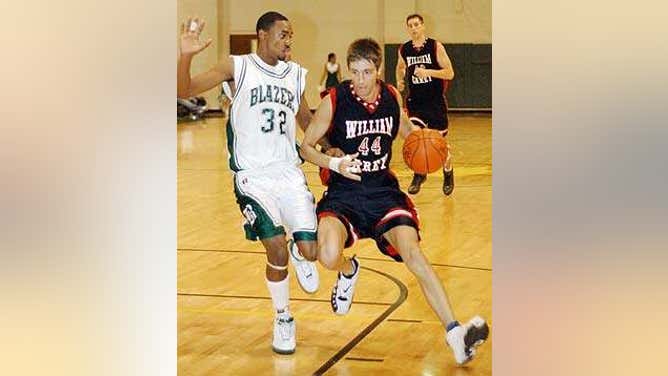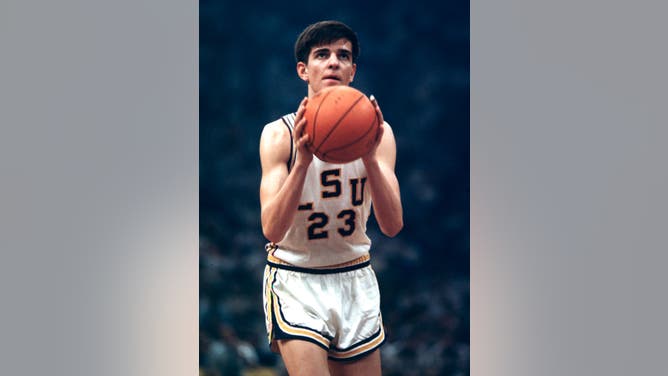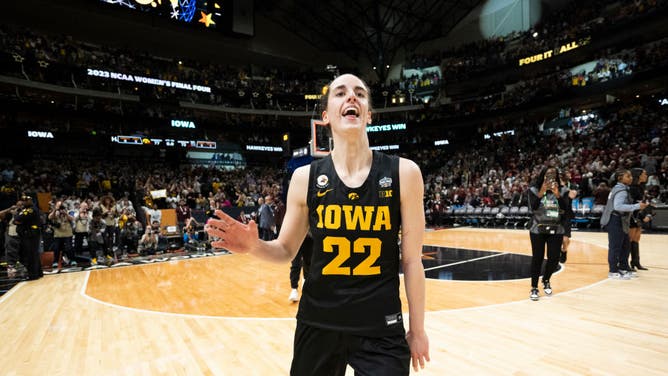Caitlin Clark Mirrors Pistol Pete Maravich In More Ways Than One
Jaeson Maravich was visiting his mom Jackie in Covington, Louisiana, near New Orleans during the Final Four last year.
"Jaeson," she called to him from the living room. "You need to see this girl play."
Jackie apparently has an eye for basketball. She met Pistol Pete Maravich at LSU in the late 1960s and married him in 1976 when he was an NBA star - just 12 years before he died of an undetected heart defect while playing pick-up basketball at age 40.
What Jaeson, who was 9 when his dad died, saw on television last spring was shocking - some sort of a long lost relative in more ways than one.
Caitlin Clark Immediately Impressed Pete Maravich's Son Jaeson
"I was really impressed right off. She's the real deal," Maravich told OutKick last week. "And she looks like she could be a cousin or something. There is definitely a resemblance to my dad - the lanky build and real dark eyes. She shoots from 30 or 35 feet like he did, and she passes the ball like a magician. Not as flashy, but a real good ball handler, too. And no one could guard her."

Pistol Pete Maravich averaged 44.2 points, 6.5 rebounds and 5.1 assists at LSU from 1967-70. Caitlin Clark is averaging 28.3 points, 7.1 rebounds and 8.1 assists a game in her career as a fourth-year senior at Iowa. (Getty Images).
Jackie and Jaeson Maravich saw on ESPN that Friday night, March 31, was what much of the nation saw. An average of 5.5 million watched, which was the most viewers for a college basketball game on ESPN - men or women - since the Duke-North Carolina men's game in 2008.
What the Maraviches saw was skinny, lanky, point guard Caitlin Clark of No. 2 Iowa score 41 points with eight assists and six rebounds to upset No. 1 and 36-0 South Carolina, 77-73, in a national semifinal at the Final Four in Dallas. Clark became the first player in women's NCAA Tournament history to score 40 points or more in back-to-back games and just the second player to score 40 or more in a Final Four game.
Maravich averaged an NCAA record 44.2 points a game in his three-year college career from 1967-70 when freshmen were not eligible. And there was no 3-point shot.

Pete Maravich's son Jaeson Maravich (No. 44) averaged 20 points a game for NAIA William Carey College in Hattiesburg, Mississippi, in the 2002-03 and 2003-04 seasons. His dad wore No. 44 in the NBA with Atlanta and New Orleans. (Photo Courtesy Of Jaeson Maravich).
"I don't keep up with women's basketball, so I was like, ‘Who is this?’ I mean, she was hitting from 30 feet," Jaeson Maravich said. "She can stop on a dime from 25 or 30 feet. She's very unpredictable. She has great composure and confidence and really is an all-around player like dad."
Maravich's career shooting percentage was .438. Clark's is .465.
And Clark, a native of Des Moines, Iowa, who is not related to the Maravich family, is just 51 points away from breaking Maravich's NCAA career scoring record of 3,667 points. The senior point guard scored 24 with 15 rebounds and 10 assists in a 101-85 win over Illinois Sunday. She is at 3,617 points now in her four-year college career.
No. 4 Iowa (24-4, 13-3 Big Ten) plays at Minnesota (15-12, 5-11 Big Ten) on Wednesday (9 p.m., Peacock) before hosting No. 2 Ohio State (23-3, 14-1 Big Ten) on Sunday (1 p.m., FOX). She averages 32 points a game this season and hit a career-high 49 on Feb. 15 against Michigan when she broke the NCAA women's career scoring record.
Maravich played in only 83 games in his college career. Clark has played in 128 with two regular season games to go, potentially three in the Big Ten Tournament and six in the NCAA Tournament. Clark could stay at Iowa for a fifth season in 2024-25 because of the extra-year rule from COVID in 2020 when she was a freshman.
Caitlin Clark Leads Nation In Scoring, Assists, 3-Pointers
Maravich also holds the NCAA record for most career games of 50 points or more with 28. Clark leads the nation in scoring (32.4 points a game), in assists (8.5 a game) and in 3-pointers (5.3 a game).
Since Maravich shot so often from beyond the 3-point line without knowing it, it has been estimated that he would have scored more than 4,500 points in his career. Throw in the 771 he scored as a freshman in 1966-67, and he would have 5,271 points. And that's excluding however many 3-pointers he would have had his freshman year.
"It's two different records," Maravich said. "But I'm happy for her. She's a great player and deserves whatever she gets. She is a good person, and it's a great thing for the younger generation. It's cool how they have similar games."
People often do not realize that Maravich was a big guard at 6-foot-5 who averaged 6.5 rebounds and 5.1 assists a game at LSU. Clark, a taller guard in the women's game as well at 6-0, has averaged 7.1 rebounds and 8.1 assists a game in her career.
And they have similar angular, thin faces.

Caitlin Clark is 51 points away from Pistol Pete Maravich's NCAA career scoring record of 3,667 points from 1967-70 at LSU and is expected to pass that mark over the next two games. (Getty Images)
"It's funny how they look alike," Maravich said.
While Maravich was known for his floppy hair and socks, Clark has been called "Ponytail Pete."
"I saw somebody called me ‘Ponytail Pete.’ I thought that was kind of funny," Clark said at the Final Four last year. "I think just a tremendous compliment. I am familiar with his game. I've seen a lot of his highlights. I take a lot of pride in being able to do a lot of different things for my team. I think the passing can get overlooked at times."
Ironically, it was LSU that ended Clark's and Iowa's season last year in the national championship game - 102-85.
Pete Maravich Made The ‘Final Four’ In 1970
Maravich and LSU also made the Final Four in 1970. The prestigious National Invitation Tournament Final Four at the time, that is, at Madison Square Garden in New York with Army, St. John's and eventual champion Marquette, which beat LSU in the semi and St. John's for the title.
Much like Maravich did throughout the Southeastern Conference, Clark is selling out road arenas as often as the Carver-Hawkeye Arena in Iowa City.
Both are iconic Americana. During particularly spectacular games, road fans would cheer for Maravich. The same thing has happened for Clark this season throughout the Big Ten.

LSU superstar Pete Maravich averaged 44.2 points a game over 83 games in three seasons of his college career from 1967-70. (Getty Images)
Maravich never won a national championship or an NBA title. But he has been lauded for decades as one of the greatest players in history - if not the greatest. Clark may not win a national title, either, but her legacy already seems secure by many.
"He'd make up shots in the air," Los Angeles Lakers great Magic Johnson said of Maravich. "The no-look passes, dribble the ball, then pat it with one hand and pass. That's where I got that from. He was the greatest. He changed the game. He was before his time. He did what I did long before I did."
Caitlin Clark Is A ‘Cultural Phenomenon’ As Was Pete Maravich
Former Duke star and ESPN analyst Jay Bilas put Clark on Maravich's level.
"She's a cultural phenomenon unlike anything we've ever seen in basketball in my view," he said on a recent ESPN college basketball GameDay. "And it goes beyond the scoring record. She's not elevated the women's game. She's elevated the game. In that regard, we will not see her like again, in my judgment."
Maravich is believed to have pushed young boys to basketball courts around the country in the 1960s, ‘70s and ’80s like no other player.
"Can you imagine the young girls who are looking at Clark right now and dreaming in a way that they've never dreamed before about the game?," Bilas said.

Caitlin Clark is the NCAA women's all-time leading scorer. (Getty Images)
A popular Clark comparison is to Golden State's Steph Curry.
"I don't compare her to Steph Curry," ESPN GameDay's Seth Greenberg said. "I compare her to Pistol Pete Maravich. Her passing, her basketball IQ. Like Maravich, she makes it easier for everyone else on the floor. Like Pete, she sees plays before they happen."
Clark has already seen herself breaking Maravich's record.
Caitlin Clark Dreams Big
"Before every game, I try to take time and just visualize what I want to happen in the game," she said recently on ESPN. "I'm somebody who has really big dreams and aspirations."
So too did Maravich.
"Love never fails. Character never quits," he said. "And with patience and persistence, dreams do come true."
But they are two different records.
"She's a fantastic player - maybe the best women's player ever," said Bob Remy, who was the official scorekeeper for every New Orleans Jazz home game Maravich played in from 1974-79. "She's a better passer than shooter, which is how Pete was. He was a better scorer than he was a shooter, too. He was a showman. She puts on a show. And I hope she gets it. The only way I could be upset is if they consider that breaking Pete's record. Different times. Different game. No 3-pointer when he played."